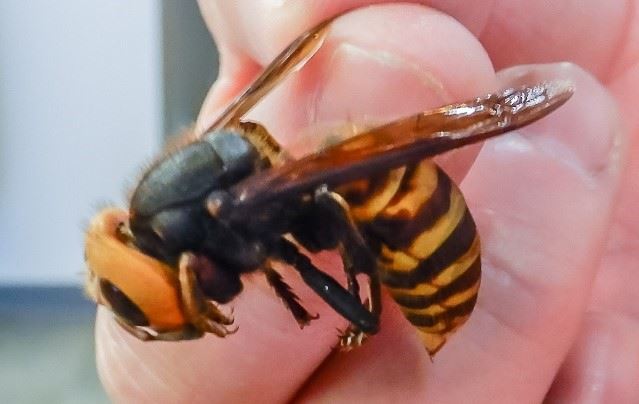The Washington State Department of Agriculture (WSDA) has issued an alert to a new pest recently discovered near Bellingham, Washington: the Asian giant hornet. It is not yet known how widely this introduce species has spread. Please take extra care when working outdoors this year.
Asian giant hornets are the world’s largest hornet species. They attack most insects, but prefer honeybees and can kill entire hives. A few hornets can destroy a hive in a matter of hours by entering a "slaughter phase" where they kill bees by decapitating them. They then defend the hive as their own, taking the brood to feed their own young. They also attack other insects but are not known to destroy entire populations of those insects. They have also been known to feed on fruit.

Unlike most wasps and hornets, the Asian giant hornet nests in the ground. This species also poses a human health threat because their venom is more toxic than that of any local bees or wasps and can be deadly if one is stung more than once. Learn more about them at agr.wa.gov/hornets.
Special precautions for pesticide applicators and pest control companies:
• When working outdoors, keep an eye out for Asian giant hornets. If you see any, please report them (with a photograph if you can get one safely) at agr.wa.gov/hornets. or your state agriculture department.
• DO NOT approach Asian giant hornets if you see them. They can sting through normal clothing as well as typical beekeeping attire.
• Take extra care not to step on an Asian giant hornet nest. Asian giant hornets prefer nesting in wooded locations in the ground, but also have been known to nest in rotted tree trunks near the ground and—rarely—in human habitations.
• Repeated stings from an Asian giant hornet can kill you. If you receive multiple Asian giant hornet stings, seek medical attention immediately.
• If you are contacted by the public to remove an Asian giant hornet nest, contact your state department of agriculture. The WSDA has obtained special equipment for the safe removal of Asian giant hornet nests. Attempting to remove an Asian giant hornet nest without proper safety equipment could prove deadly.
Report Asian giant hornet sightings at:
• agr.wa.gov/hornets
• PestProgram@agr.wa.gov
• 800/443-6684
The original version of this article was sent to pesticide operators in Washington state. It has been edited it for the AZH Blog. Additional information about the Asian giant hornet and descriptions of more common hornets can be found at agr.wa.gov/hornets.
Katrina Lindahl, Woodland Park Zoo